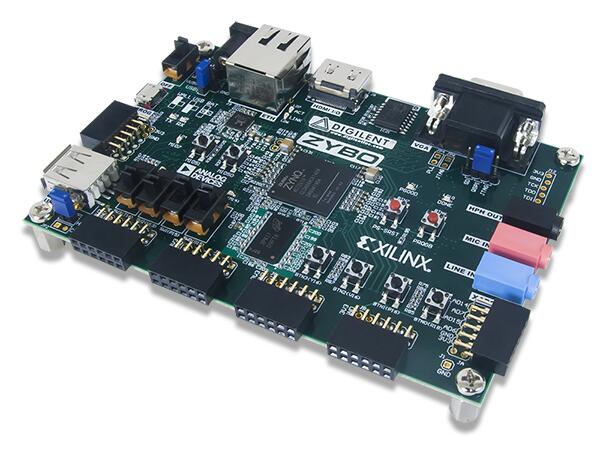Digilent Zybo
Overview
The Digilent Zybo (ZYnq BOard) is a feature-rich, ready-to-use embedded software and digital circuit development board. It is built around the Xilinx Zynq-7000 family, which is based on the Xilinx All Programmable System-on-Chip (AP SoC) architecture. This architecture tightly integrates a dual-core ARM Cortex-A9 processor with Xilinx 7-series Field Programmable Gate Array (FPGA) logic.

Digilent (Credit: Digilent)
Hardware
Supported Features
The zybo board configuration supports the following hardware features:
Interface |
Controller |
Driver/Component |
|---|---|---|
GICv1 |
on-chip |
ARM generic interrupt controller v1 |
ARCH TIMER |
on-chip |
ARM architected timer |
PINCTRL |
on-chip |
pinctrl |
GPIO |
on-chip |
gpio |
UART |
on-chip |
serial port-polling; serial port-interrupt |
The default configuration can be found in boards/digilent/zybo/zybo_defconfig
Other hardware features are not currently supported by the port.
Programming and Debugging
The Zynq-7000 series SoC needs to be initialized prior to running a Zephyr application. This can be
achieved in a number of ways (e.g. using the Xilinx First Stage Boot Loader (FSBL), the Xilinx
Vivado generated ps_init.tcl JTAG script, Das U-Boot Secondary Program Loader (SPL), …).
The instructions here use the U-Boot SPL. For further details and instructions for using Das U-Boot with Xilinx Zynq-7000 series SoCs, see the following documentation:
Building Das U-Boot
Clone and build Das U-Boot for the Digilent Zybo:
git clone -b v2022.04 https://source.denx.de/u-boot/u-boot.git
cd u-boot
make distclean
make xilinx_zynq_virt_defconfig
export PATH=/path/to/zephyr-sdk/arm-zephyr-eabi/bin/:$PATH
export CROSS_COMPILE=arm-zephyr-eabi-
export DEVICE_TREE="zynq-zybo"
make
Flashing
Here is an example for running the Hello World application via JTAG.
Ensure the board is configured for JTAG boot, open a serial terminal, turn on/reset the board (press
the PS-SRST button), and initialize the Zynq-7000 series SoC by uploading and running the U-Boot
SPL via JTAG.
Next, upload and run the Zephyr application:
# From the root of the zephyr repository
west build -b zybo samples/hello_world
west flash
You should see the following message in the terminal:
*** Booting Zephyr OS vx.xx.x-xxx-gxxxxxxxxxxxx ***
Hello World! zybo
Another option is to load and run the Hello World application via U-Boot. Copy
u-boot/spl/boot.bin, u-boot/u-boot.img, and zephyr/zephyr.bin to a FAT32 formatted
microSD card, insert the card in the SD MICRO slot on the Zybo board, ensure the board is
configured for SD boot, and turn on the board.
Once U-boot is done initializing, load an run the Zephyr application:
Zynq> fatload mmc 0 0x0 zephyr.bin
817120 bytes read in 56 ms (13.9 MiB/s)
Zynq> go 0x0
## Starting application at 0x00000000 ...
*** Booting Zephyr OS vx.xx.x-xxx-gxxxxxxxxxxxx ***
Hello World! zybo
Debugging
Here is an example for the Hello World application.
Ensure the board is configured for JTAG boot, open a serial terminal, turn on/reset the board (press
the PS-SRST button), and initialize the Zynq-7000 series SoC by uploading and running the U-Boot
SPL via JTAG.
Next, upload and debug the Zephyr application:
# From the root of the zephyr repository
west build -b zybo samples/hello_world
west debug
Step through the application in your debugger, and you should see the following message in the terminal:
*** Booting Zephyr OS vx.x.x-xxx-gxxxxxxxxxxxx ***
Hello World! zybo